2025
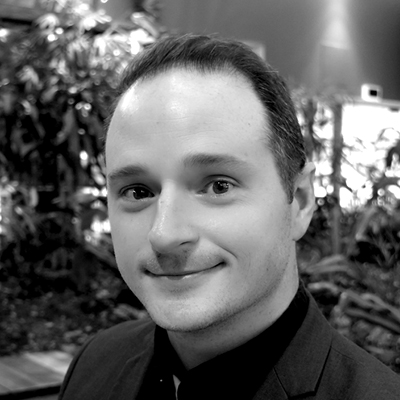
Professor Sean Gregory
Professor Shaun Gregory, winner of the Batterham Medal, is developing world-leading artificial heart technology – implantable devices that respond to the patient’s body and can offer a more long-term solution for patients than previous technologies. He also launched the Heart Hackathon, where student teams from around the world design and develop prototype artificial hearts.
2024
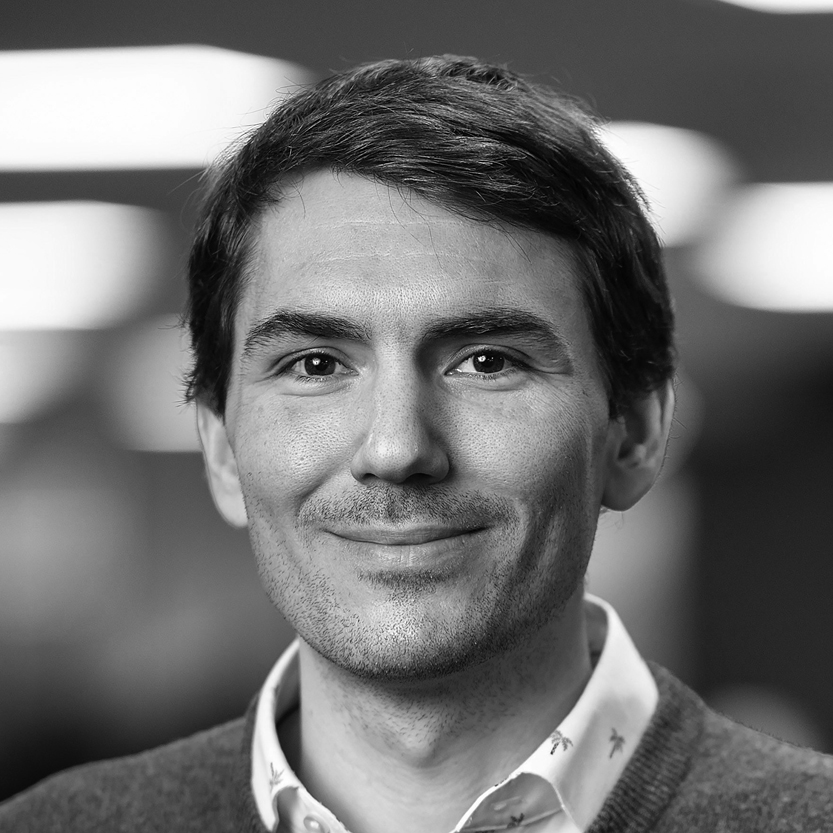
Dr Scott Menegon
2024 Winner
A structural engineer and senior lecturer at Swinburne University, Dr Scott Menegon is improving the design of multi-storey buildings across Australia – from hospitals to 60-storey apartment blocks.
With expertise in earthquake engineering, Scott’s research into both reinforced and precast concrete is helping to better prepare Australia for earthquakes – which are low-probability but high-consequence events. His research has informed Australian building standards, and he has undertaken several large-scale seismic testing programs. He is currently developing next-generation precast concrete cores as part of an innovative industry collaboration. Scott is enthusiastic about translating his research to real-world impact through education and industry guidance. He has delivered seminars and short courses to more than 2,000 practising engineers over the last five years, is the current president of the Australian Earthquake Engineering Society and has been awarded Engineers Australia’s RW Chapman Medal twice (in 2019 and 2022).
With expertise in earthquake engineering, Scott’s research into both reinforced and precast concrete is helping to better prepare Australia for earthquakes – which are low-probability but high-consequence events. His research has informed Australian building standards, and he has undertaken several large-scale seismic testing programs. He is currently developing next-generation precast concrete cores as part of an innovative industry collaboration. Scott is enthusiastic about translating his research to real-world impact through education and industry guidance. He has delivered seminars and short courses to more than 2,000 practising engineers over the last five years, is the current president of the Australian Earthquake Engineering Society and has been awarded Engineers Australia’s RW Chapman Medal twice (in 2019 and 2022).
2023
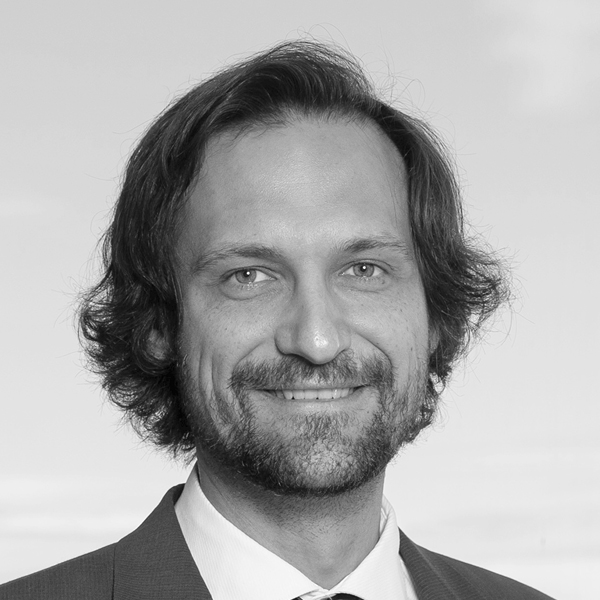
Dr Conrad Wasko
2023 Winner
2023 Winner
As a hydrological engineer, Dr Conrad Wasko has transformed our understanding of how climate change will affect floods.
Ten years ago, the scientific community knew little about the relationship between climate change and flooding. Conrad’s world-leading research has filled this global knowledge gap, discovering that we won’t see universal increases in flood events with the changing climate. Conrad has found that small floods—those that fill up water supplies—are decreasing and in contrast, larger damaging flood events are becoming more frequent.
Conrad was also the first to conclusively show that storms intensify as temperatures increase. This has implications for urban flooding as intense rainfall in concreted urban areas can result in flash floods.
A senior lecturer at the University of Melbourne and Australian Research Council Fellow, Conrad’s discoveries are helping us adapt to and mitigate changing flood and water patterns. His clear communication of complex uncertainty informs engineering recommendations and updated flood guidance across Australia.
Ten years ago, the scientific community knew little about the relationship between climate change and flooding. Conrad’s world-leading research has filled this global knowledge gap, discovering that we won’t see universal increases in flood events with the changing climate. Conrad has found that small floods—those that fill up water supplies—are decreasing and in contrast, larger damaging flood events are becoming more frequent.
Conrad was also the first to conclusively show that storms intensify as temperatures increase. This has implications for urban flooding as intense rainfall in concreted urban areas can result in flash floods.
A senior lecturer at the University of Melbourne and Australian Research Council Fellow, Conrad’s discoveries are helping us adapt to and mitigate changing flood and water patterns. His clear communication of complex uncertainty informs engineering recommendations and updated flood guidance across Australia.
2022
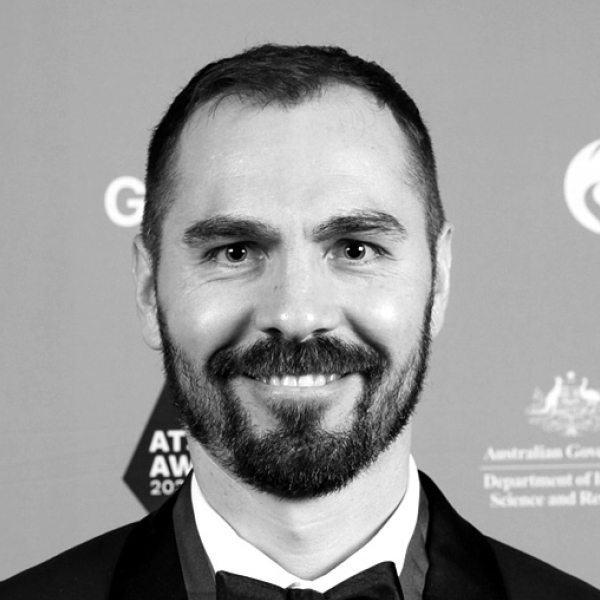
Dr Aaron McFadyen
2022 Winner
2022 Winner
Dr Aaron McFadyen is an early career researcher who has developed air traffic management technology enabling the safe expansion of drone flight numbers over urban areas.
The rapid expansion of the drone market required transformative change as the previous process for approving flights in controlled airspace was manual and could take weeks.
In close collaboration with authorities, Aaron led development of key technology now underpinning Australia’s automated approval system for drone flights.
His focus on creating autonomous technologies that balance regulatory, safety, and commercial imperatives drew on his research innovation, aerospace engineering skills, and practical aviation experience as a pilot.
Aaron’s game-changing technology has helped reduce drone flight approval times from weeks to minutes, saving operators and authorities hundreds of thousands of dollars while increasing opportunities for Australian industry.
The system focuses on drone use in highly controlled airspace around airports but it can be scaled up to cover all Australian airspace.
The rapid expansion of the drone market required transformative change as the previous process for approving flights in controlled airspace was manual and could take weeks.
In close collaboration with authorities, Aaron led development of key technology now underpinning Australia’s automated approval system for drone flights.
His focus on creating autonomous technologies that balance regulatory, safety, and commercial imperatives drew on his research innovation, aerospace engineering skills, and practical aviation experience as a pilot.
Aaron’s game-changing technology has helped reduce drone flight approval times from weeks to minutes, saving operators and authorities hundreds of thousands of dollars while increasing opportunities for Australian industry.
The system focuses on drone use in highly controlled airspace around airports but it can be scaled up to cover all Australian airspace.
2021

Dr Kate Nguyen
2021 Winner
2021 Winner
Dr Kate Nguyen is an early career researcher whose ground-breaking work is making buildings safer and construction more sustainable.
The 2017 Grenfell Tower blaze in London that claimed 72 lives exposed the dangers of aluminium composite cladding. In the aftermath of the disaster, and in collaboration with industry, Dr Nguyen came up with a light-weight, cost-effective alternative cladding material using ceramic particles that will not combust during a structural fire. She has also developed various nano-based construction products that were analysed in commercial buildings, such as the City Hall in Utrecht, the Netherlands.
She has also quickly established herself as a national expert in advancing the sustainability of fire-resistant construction materials. Partnering with industry, Dr Nguyen has provided a solution for the safe removal and transformation of combustible construction waste into high value, fire-retardant pre-fabricated building materials.
Dr Nguyen is currently the leader of the Innovative Fire and Façade Engineering Group at RMIT University, collaborating closely with some of the major construction partners who are end-users of her innovative research.
The 2017 Grenfell Tower blaze in London that claimed 72 lives exposed the dangers of aluminium composite cladding. In the aftermath of the disaster, and in collaboration with industry, Dr Nguyen came up with a light-weight, cost-effective alternative cladding material using ceramic particles that will not combust during a structural fire. She has also developed various nano-based construction products that were analysed in commercial buildings, such as the City Hall in Utrecht, the Netherlands.
She has also quickly established herself as a national expert in advancing the sustainability of fire-resistant construction materials. Partnering with industry, Dr Nguyen has provided a solution for the safe removal and transformation of combustible construction waste into high value, fire-retardant pre-fabricated building materials.
Dr Nguyen is currently the leader of the Innovative Fire and Façade Engineering Group at RMIT University, collaborating closely with some of the major construction partners who are end-users of her innovative research.
2020
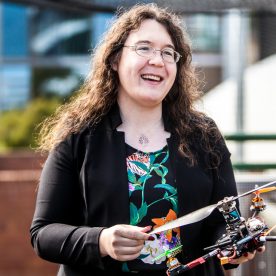
Associate Professor Pauline Pounds
2020 Winner
2020 Winner
Associate Professor Pauline Pounds is an engineering trailblazer whose groundbreaking contributions to designing unmanned aerial vehicles have been game changing for the last 15 years.
Her creative and innovative problem-solving approach has systematically eliminated many previously critical limitations on drone technology, paving the way for new generations of large multirotor drones capable of practical real-world applications ranging from package delivery to search-and-rescue operations
Associate Professor Pounds’ most recent innovation – aerodynamic motion sensors – offer unprecedented precision measurement and control.
Her rotor velocimetry technology is the best in the world, and enables safer, more effective drone use in challenging conditions.
Her creative and innovative problem-solving approach has systematically eliminated many previously critical limitations on drone technology, paving the way for new generations of large multirotor drones capable of practical real-world applications ranging from package delivery to search-and-rescue operations
Associate Professor Pounds’ most recent innovation – aerodynamic motion sensors – offer unprecedented precision measurement and control.
Her rotor velocimetry technology is the best in the world, and enables safer, more effective drone use in challenging conditions.
2019
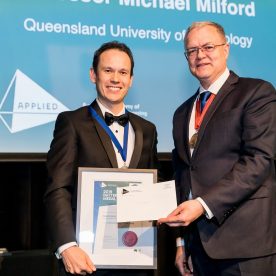
Professor Michael Milford
FTSE
2019 Winner
2019 Winner
Professor Milford’s pioneering transdisciplinary research spans biology, neuroscience, robotics, machine learning and computer vision to create new technologies for autonomous vehicles and robotics. His team has achieved world-first advancements in translating abstract neuroscience concepts and theories into rugged technology that is being trialled in real-world commercial applications. Professor Milford’s internationally renowned contributions to his field of engineering have resulted in major research and industry funding, many prestigious international and national awards, and high-profile collaborations and projects with end-users including Caterpillar, the US Air Force, the Queensland Government, Google Deepmind and NASA’s Jet Propulsion Laboratory.
2018
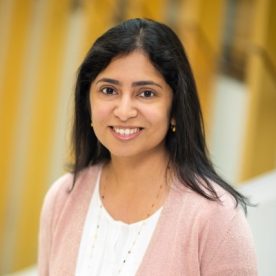
Associate Professor Madhu Bhaskaran
FTSE
2018 Winner
2018 Winner
Just eight years after completing her PhD, Associate Professor Madhu Bhaskaran is pioneering research in oxide-based flexible electronics – stretchy, unbreakable, transparent electronic devices. She developed a transfer process to make these devices functional, combining brittle oxide materials (like those making up a smartphone touchscreen) with soft, pliable silicone rubber. Potential applications abound in optics research, as well as use as gas sensors to pick up pollutants and as patches to track UV exposure.
2017
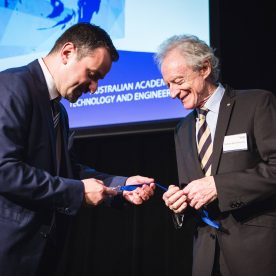
Professor Nick Birbilis
2017 Winner
2017 Winner
Professor Birbilis has had an impressive career to date. Then 39, he is a professor, the Head of Materials Science and Engineering and is the Woodside Innovation Chair at Monash University. He is an internationally recognised expert in corrosion, durability management and the behaviour of metallic elements.
2016
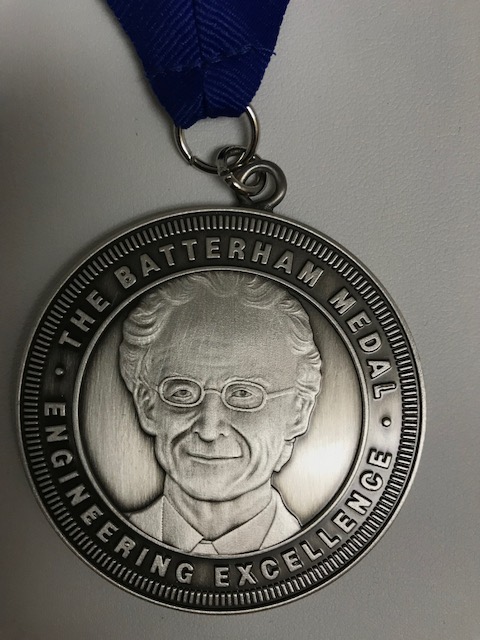
Associate Professor Andrew Fleming
2016 Winner
2016 Winner
Andrew Fleming is Associate Professor of Electrical Engineering at the University of Newcastle, where he graduated with a PhD in 2004. He has made an outstanding contribution to the science and engineering of nanoscale imaging and fabrication systems. A recognised expert in the modelling, control and engineering of ultra-high-precision imaging and fabrication systems, Associate Professor Fleming has consulted on some of the world’s most ambitious scientific and industrial projects for NASA, The National Accelerator Laboratory, The Lawrence Berkeley Laboratory, Boeing, Stanford University, Nikon Research, and the Defence Science and Technology Group in Australia.
2015
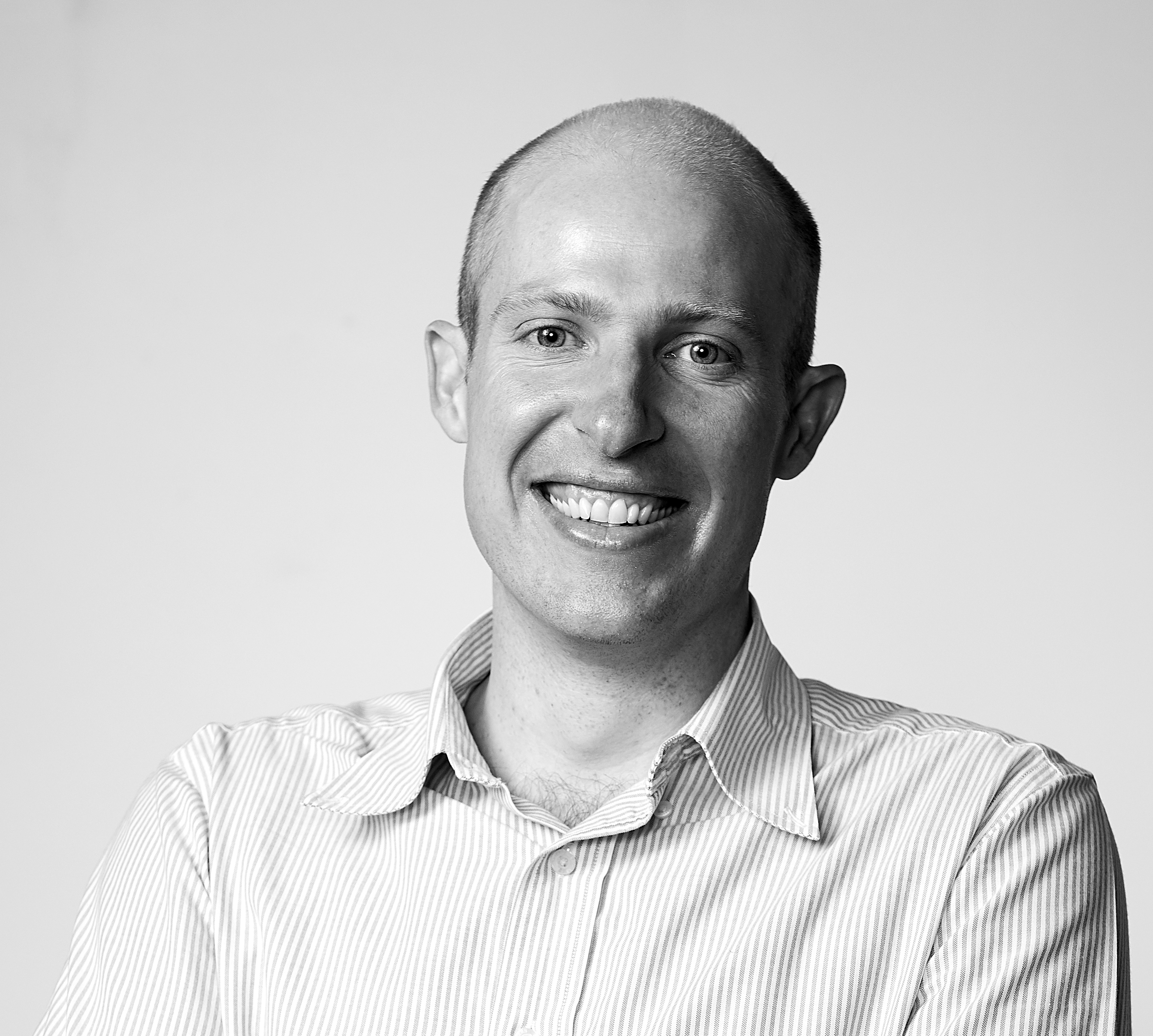
Dr Lachlan Blackhall
FTSE
2015 Winner
2015 Winner
Dr Blackhall is founder and Chief Technology Officer of Reposit Power, a technology company designing advanced control systems for grid-deployed energy storage in the ACT. As CTO, he has pioneered the use of distributed control schemes to manage, control and optimise the performance of distributed energy storage systems. The control system he has developed not only optimises the storage and shifting of excess solar generation but, in a world first, allows the trading of distributed stored energy directly with energy utilities and the broader energy market.
Lachlan Blackhall was elected to the Academy in 2017.
Lachlan Blackhall was elected to the Academy in 2017.







